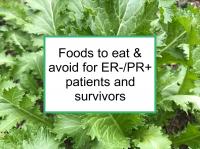Invasive breast cancers classified as estrogen receptor negative and progesterone receptor positive (ER-/PR+/HER2+ or ER-/PR+/HER2-) are relatively rare. In ER-/PR+ tumors, the relevant genes cause the cancer cells to express progesterone receptors, but not estrogen receptors.
Women with ER-/PR+ breast cancer are more likely to be premenopausal. Because this subtype is rare, we have not come across many studies that have found an association between the risk of ER-/PR+ breast cancer and consumption of a particular food or food group. Alcohol consumption has been found to increase the risk of this subtype in Chinese women.
Since women with ER-/PR+ breast cancer tend to be younger than the average breast cancer patient, we have prepared a list below of foods that have been shown to be associated with ER- breast cancer in premenopausal women.
Foods that reduce risk of ER- disease in premenopausal women
The following foods have been found to be associated with reduced risk of ER- breast cancer in premenopausal women:
Please read the applicable food webpages when making your own food lists since these pages contain important advice, food rankings (e.g., highly recommended, recommended in moderation), consumption limits, and other pertinent information.
Foods that increase the risk of ER- disease in premenopausal women
Butter, corn oil and coffee (for some women) have been found specifically to increase the risk of ER- breast cancer in premenopausal women. Those with ER-/PR+ breast cancer would probably benefit from following the guidance for triple negative breast (ER-/PR-/HER2-) cancer food and supplement choices.
Supplements for ER-/PR+ patients and survivors
There is no supplement or combination of supplements that has been proven to reliably reduce the risk of ER-/PR+ breast cancer recurrence in women. Attempting to take advantage of the apparent treatment effects of micronutrients and other dietary components by using supplements carries the risk of adverse and paradoxical effects, including promoting breast cancer growth and metastasis.
What is known is that when a beneficial micronutrient is administered at low doses by consuming food, it is likely to have subtle chemopreventive effects, whereas when the same micronutrient is administered at high doses, it is more likely to have pharmacological effects, with mostly unknown results. It is best to obtain beneficial compounds by consuming food, if possible. Supplements make sense if medically necessary or to make up for deficiencies that are difficult to correct through diet.
The following supplements generally have been found to be safe and beneficial for ER-/PR+ patients and survivors:
Please consult your oncology team for advice concerning your situation and dosages. It might make sense to be tested for vitamin D deficiency and plan for follow-up testing to determine if your reading has reached a desirable level.
Additional comments
ER-/PR+ breast cancer patients and survivors would benefit from eating a wide variety of the foods on our recommended food list and limit or avoid those on our avoid list, in addition to paying particular attention to the foods listed above.
Below are links to 20 studies concerning ER-/PR+ disease and diet.
